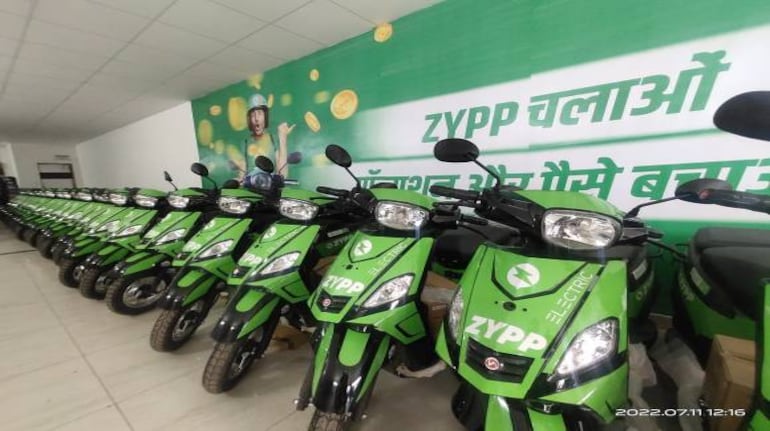



Zypp Electric, which runs an EV-as-a-Service (EVaS) platform, is looking to deploy 200,000 electric two-wheelers (E2Ws) across the country by December 2025.
The Gurugram-based start-up, which provides electric scooters for last-mile deliveries to companies, is also looking to expand its operations to cities, such as Mumbai, Pune, Jaipur, Hyderabad, Calcutta, Chennai, and Ahmedabad.
“We provide EV+Rider service to customers and help them to reduce last-mile delivery cost with lesser churn. We have crossed 1.5 million deliveries per month and saved around 29 mn KG Co2 till now. We are adding 1,000 vehicles every month and plans are afoot to deploy 100,000 in the next 18 months and double that count by December 2025,” says Akash Gupta, the Co-Founder of Zypp Electric.
Founded in 2017, Zypp Electric delivers groceries, medicines, food, and packages from point A to point B through IoT and AI-enabled scooters. Its technology also tracks batteries that can be replaced at Zypp swapping stations. Zypp, which follows an asset-light business model, has tied up with leasing firms for financing vehicle purchases for its driver partners.
To expand its fleet size, the EVaS provider is in talks with Ola Electric, Okinawa, and Ather, for sourcing more vehicles. “We being OEM agnostic are happy to work with a mix of three to four key OEMs that can follow our product, service and pricing guidelines,” added Gupta.
At present, it has a fleet of 8,000 vehicles, which are deployed in Delhi, NCR (7,400) and Bengaluru (600). While Hero Electric’s Nyx e-scooter accounts for 60 percent of the fleet, a few batches have been sourced from OEMs such as SES, Gemopai, Lohia, and Kinetic Electric.
“We are essentially trying to solve how to electrify last-mile delivery because that is where the biggest pollution generation is happening. That is where the drivers are suffering,” Gupta said.
Some of the major players that Zypp caters to in the B2B space are Zepto, BigBasket, Blinkit, Zomato, Porter, Uber, Rapido, Dunzo, Grofers, and JioMart.
“We are working to convert all last-mile deliveries of e-commerce, grocery, medicine, and food verticals to go electric with our e-scooter sharing app. That will ensure we make last-mile delivery more affordable, time-saving, and with zero emissions. Some of the customers where we are planning to deploy in future are Flipkart, Amazon, Udaan, Dominos, Snapdeal, Haldiram, Shiprocket, and Box8, beside other D2C and hyperlocal brands looking for delivery solutions,” said Gupta.
Recently, Zypp Electric inked a partnership with Gogoro for offering battery-swapping services in Delhi and NCR as a pilot.
As Gupta puts it, “This is a battery-swapping partnership meant for driver partners who want to do 200-km trips on a single charge. Since currently they cannot go beyond 100-120 km (on a single charge), battery swapping is the only alternative. Otherwise, (for fixed batteries) there is a waiting time of three to four hours for charging bikes. We will be deploying 100 vehicles with about six swapping stations for this pilot project.”
Zypp Electric has raised about $9 million in equity and $5 million in bike leasing and is near closing Series B funding, where it is planning to raise $25-30 million.
Its current Annual Run Rate (ARR) is about $15 million and is expecting $500 million ARR by December 2024. Having clocked a turnover of Rs 22.35 crore in FY22, it is on course to cross the Rs 100-crore revenue mark in FY23.
Annual Run Rate is the yearly version of Monthly Recurring Revenue (MRR). ARR projects a company’s revenue for the full year.
“Since last year, we have grown 10x in fleet size, from about 600 e-scooters in April 2021 to 6,000+ e-scooters in May 2022 and ARR (from $1.5 mn to $15 mn). Our aim is to accelerate last-mile delivery to go 100 percent sustainable with EVs by 2025. We are projecting Rs 1,000 crore revenue by FY24. We are expecting to earn net profit from October 2023 onwards,” said Gupta.
Discover the latest Business News, Sensex, and Nifty updates. Obtain Personal Finance insights, tax queries, and expert opinions on Moneycontrol or download the Moneycontrol App to stay updated!
Find the best of Al News in one place, specially curated for you every weekend.
Stay on top of the latest tech trends and biggest startup news.